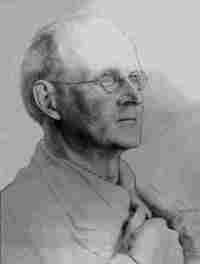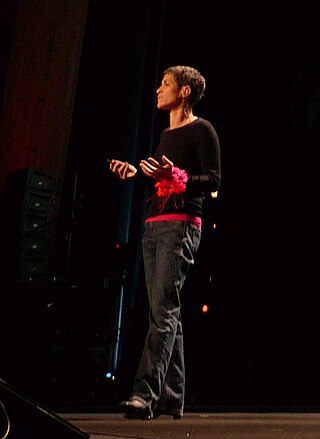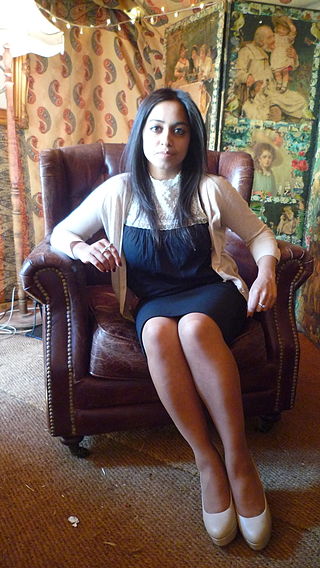Susan Rose Wolf is an American moral philosopher and philosopher of action who is currently the Edna J. Koury Professor of Philosophy at the University of North Carolina at Chapel Hill. She taught previously at Johns Hopkins University (1986–2002), the University of Maryland (1981–1986) and Harvard University (1978–1981).

Charles Kay Ogden was an English linguist, philosopher, and writer. Described as a polymath but also an eccentric and outsider, he took part in many ventures related to literature, politics, the arts, and philosophy, having a broad effect particularly as an editor, translator, and activist on behalf of a reformed version of the English language. He is typically defined as a linguistic psychologist, and is now mostly remembered as the inventor and propagator of Basic English.

George Saunders is an American writer of short stories, essays, novellas, children's books, and novels. His writing has appeared in The New Yorker, Harper's, McSweeney's, and GQ. He also contributed a weekly column, "American Psyche", to The Guardian's weekend magazine between 2006 and 2008.

Bahuleyan Jeyamohan is an Indian Tamil and Malayalam language writer and literary critic from Nagercoil in the Indian state of Tamil Nadu.

Anthony Clifford Grayling is a British philosopher and author. He was born in Northern Rhodesia and spent most of his childhood there and in Nyasaland. In 2011 he founded and became the first Master of New College of the Humanities, an independent undergraduate college in London. Until June 2011, he was Professor of Philosophy at Birkbeck, University of London, where he taught from 1991. He is also a supernumerary fellow of St Anne's College, Oxford, where he formerly taught.
Shadia B. Drury is a Canadian academic and political commentator. She is a professor emerita at the University of Regina. In 2005, she was elected a Fellow of the Royal Society of Canada.

Richard Theodore Tarnas is a cultural historian and astrologer known for his books The Passion of the Western Mind: Understanding the Ideas That Have Shaped Our World View and Cosmos and Psyche: Intimations of a New World View. Tarnas is professor of philosophy and psychology at the California Institute of Integral Studies, and is the founding director of its graduate program in Philosophy, Cosmology, and Consciousness.

Margaret Wertheim is an Australian-born science writer, curator, and artist based in the United States. She is the author of books on the cultural history of physics, and has written about science, including for the New York Times, Los Angeles Times, Guardian, Aeon and Cabinet. Wertheim and her twin sister, Christine Wertheim, are co-founders of the Institute For Figuring (IFF), a Los Angeles–based non-profit organization through which they create projects at the intersection of art, science and mathematics. Their IFF projects include their Crochet Coral Reef, which has been shown at the 2019 Venice Biennale, Hayward Gallery (London), Museum of Arts and Design (NYC), and the Smithsonian's National Museum of Natural History. For her work with public science engagement, Wertheim won the 2016 Klopsteg Memorial Award from the American Association of Physics Teachers and Australia's Scientia Medal (2017).

Dag Herbjørnsrud is a historian of ideas, author, a former editor-in-chief, and a founder of Center for Global and Comparative History of Ideas in Oslo. His writings have been published by Aeon, the American Philosophical Association (APA), Dialogue and Universalism, Cosmopolis, etc., and he was formerly a columnist for Al Jazeera English. Herbjørnsrud was the guest editor of a special issue of the bilingual journal Cosmopolis (Brussels), on "Decolonizing the Academy"; one of his contributors was the author and Professor Ngũgĩ wa Thiong'o. He sits on the Editorial Review Board of the book series Global Epistemics at Rowman & Littlefield.
A fringe theory is an idea or a viewpoint that differs significantly from the accepted scholarship of the time within its field. Fringe theories include the models and proposals of fringe science, as well as similar ideas in other areas of scholarship, such as the humanities. In a narrower sense, the term fringe theory is commonly used as a pejorative, roughly synonymous with the term pseudo-scholarship. Precise definitions that make distinctions between widely held viewpoints, fringe theories, and pseudo-scholarship are difficult to construct because of the demarcation problem. Issues of false balance or false equivalence can occur when fringe theories are presented as being equal to widely accepted theories.
The Oxford Group or Oxford Vegetarians consisted of a group of intellectuals in England in the late 1960s and early 1970s associated with the University of Oxford, who met and corresponded to discuss the emerging concept of animal rights, or animal liberation.
Jessa Gamble, née Sinclair, is a Canadian and English author and co-owner of the science blog The Last Word on Nothing. Her book, The Siesta and the Midnight Sun: How Our Bodies Experience Time, documents the rituals surrounding daily rhythms. Along with local languages and beliefs, these schedules are losing their global diversity and succumbing to what Gamble calls "circadian imperialism." The foreword was written by Canadian broadcaster Jay Ingram.
Effective altruism (EA) is a 21st-century philosophical and social movement that advocates impartially calculating benefits and prioritizing causes to provide the greatest good. It is motivated by "using evidence and reason to figure out how to benefit others as much as possible, and taking action on that basis". People who pursue the goals of effective altruism, who are sometimes called effective altruists, follow a variety of approaches proposed by the movement, such as donating to selected charities and choosing careers with the aim of maximizing positive impact. The movement has achieved significant popularity outside of academia, spurring the creation of university-based institutes, research centers, advisory organizations and charities, which, collectively, have donated several hundreds of millions of dollars.
The Bragg UNSW Press Prize for Science Writing was established in 2012 to recognise excellence in Australian science writing. The annual prize of A$7,000 is awarded to the best short non-fiction piece of science fiction with the aim of a general audience. Two runners up are awarded $1,500 each.

Relationship anarchy is the application of anarchist principles to intimate relationships. Its values include autonomy, anti-hierarchical practices, anti-normativity, and community interdependence. RA is explicitly anti-amatonormative and anti-mononormative and is commonly, but not always, non-monogamous. This is distinct from polyamory, solo poly, swinging, and other forms of “dating”, which may include structures such as amatonormativity, hierarchy of intimate relationships, and autonomy-limiting rules. It has also been interpreted as a new paradigm in which closeness and autonomy are no longer considered to create dilemmas within a relationship.

Shahidha Bari is a British academic, critic and broadcaster in the fields of literature, philosophy and art. She is a professor at the University of the Arts London based at London College of Fashion. She is a host of the topical arts television programme Inside Culture on BBC Two, standing in for Mary Beard, one of the presenters of the BBC Radio 4 arts and ideas programme Free Thinking, and an occasional presenter of BBC Radio 4's Front Row.

Elizabeth Currid-Halkett is an American academic and author. She is the James Irvine Chair of Urban and Regional Planning and Professor of Public Policy at the University of Southern California.

Abigail Thorn is an English YouTuber, actress, and playwright.

Philip Goff is a British author, idealist philosopher, and professor at Durham University whose research focuses on philosophy of mind and consciousness. Specifically, it focuses on how consciousness can be part of the scientific worldview. Goff holds that materialism is incoherent and that dualism leads to "complexity, discontinuity and mystery". Instead, he advocates a "third way", a version of Russellian idealist monism that attempts to account for reality's intrinsic nature by positing that consciousness is a fundamental, ubiquitous feature of the physical world. "The basic commitment is that the fundamental constituents of reality—perhaps electrons and quarks—have incredibly simple forms of experience."












